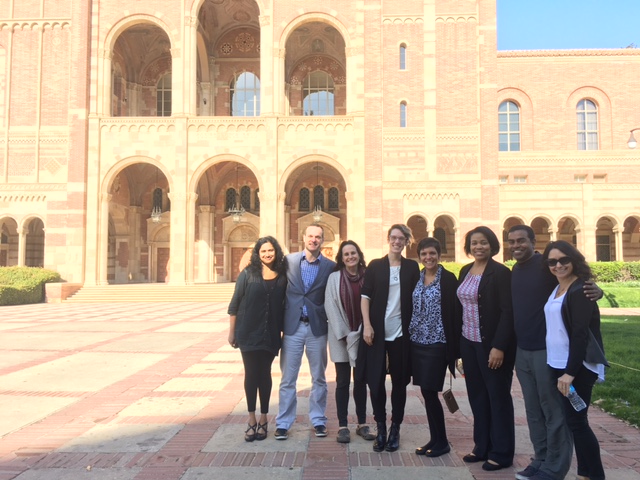I have struggled to find my place in my online communities as the political ground has so dramatically shifted in the past few months. The US Presidential election fostered a climate that counters so much of what I stand for as an educator and a citizen. My twitter feed has been taken over by politics as I watch so many institutions struggle to uphold our democracy, institutions designed to safeguard cherished ideals like free speech, the right to assemble, and the pursuit of happiness.
I am grateful to have spent the week between Martin Luther King, Jr. Day and the Inauguration with a group of like-minded scholars at a Spencer-sponsored conference at UCLA. We share a commitment to preparing asset- and equity-oriented educators, so it was a great moment to figure out what that might mean in the years ahead.

Left to right: Manka Varghese, Matt Diemer, me, Lauren Anderson, Mariana Souto-Manning, Dorinda Carter Andrews, Thomas Philip, Jamy Stillman

Clockwise from left: Gloria Ladson-Billings, Mariana Souto-Manning, Lauren Anderson, Elizabeth Self, Thomas Philip, Matt Diemer, me, Alfredo Artiles, Marilyn Cochran-Smith, Sharon Feiman-Nemser, Jamy Stillman, Josephine Pham, Dorinda Carter Andrews
It was a productive week for clarifying my values and commitments. We even wrote an editorial together arguing against Betsy DeVos’s appointment as Secretary of Education.
I think I will need to return to these commitments a lot over the coming years. For this reason, I am going to go back to basics and sharing those commitments with you.
To be sure, I have no illusions that the prior administration upheld my educational values. Market-based reforms have been a centerpiece of educational policy for the past several administrations. President Bush’s landmark legislation No Child Left Behind certainly advanced this agenda, but President Obama’s Race to the Top put it on steroids. By tying teaching and learning to narrow metrics, discourses of desirable educational outcomes became less about children’s growth, their humanity, and their potential as future citizens. On the whole, national goals for children’s learning slid to the bottom of Bloom’s Taxonomy.
I believe in education as a public good. We live in a time and place where the ethos of individualism prevails. In this logic, if my kids are okay, everything is fine. In contrast, if we see education as a public good, our concerns must extend beyond our own children into our communities, states, and country. Whether we realize it or not, we have a vested interest in the solid education of all our citizens. To take an example that begins with individual needs, I want the nurse administering my chemo to know the difference between .5 L and .05 L when pulling the dose. Beyond that basic skill, I also want him to be an empathetic person who can talk my family and I through our fear. There are countless situations where our personal interests depend on others’ competence and humanity.
Market-based reforms emphasize competition between institutions. This corrodes the ideal of schools as places that should be serving children and communities, contributing to their development and well-being. In a market-based framework, there are winners and losers, successes and failures. Despite meritocratic ideas, these winners and losers are not determined by raw talent but rather the status and resources of children and their families. I recognize that education has always been an unevenly distributed resource, especially in the U.S. I felt I could do my work as an advocate, because there were enough shared commitments to democratic ideals of opportunity. I am not so sure at this moment.
I believe that meaningful learning engages the whole person. It is not just knowing but also becoming. In my work, I study what it means to teach in ways that allow children become mathematicians. I also study what it means for teachers to become humanistic educators who engage with children’s experiences, build learning communities, and respond thoughtfully to children’s ideas.
Some children, however, are given more opportunities to become themselves than others. This starts with issues of language and culture, with some children’s home language and culture fitting into the social patterns of school, providing an important resource for their success there. Aside from such cultural capital, parents actual capital allows them to navigate the system in radically different ways. I have noticed a pattern in middle class parents’ rationale for sending their children to private schools. Most of the time, they are working to preserve their child’s competence. A child’s anxiety increases untenably in a test-prep focused school. A child’s difficulties with memorization lead to failing grades in a narrow curriculum. A child’s artistic strengths are not given adequate play in the school day. A child is inadequately challenged by a constantly changing cast of temp-work teachers.
I believe that strong community schools can anchor families and bring neighborhoods together around common concerns. Community schools, at their best, provide gathering places. They allow neighborhoods to feel like neighborhoods, with children getting to know the people around them. When there is a shared concern, community schools provide a space for people to come together around that concern. Dissolving community schools feels like another part of the effort to weaken the collective impact of people with shared interests.
In short, I believe that public education is central to meeting the ideals of our democracy. I know that a lot of work needs to be done to have it meet these ideals, but if we gut it completely, we will only be further behind on meeting the potential and promise of America.